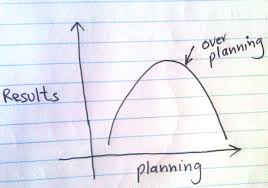
Time and time again we are presented with phases of our lives to check off of our list. Going to school, maybe university for some, graduate school for others, getting a job, moving out of our parents’ home, paying off loans or a mortgage, dating, getting married, having children, retiring, and you know what’s next…
Enjoying your retirement, of course!
While planning is a ritual that helps us keep our routine in order, whether on a daily or weekly basis, there is an extent at which planning can actually become harmful. Over-planning can stifle our creativity, ignore our need for exploration and novelty, and even contribute to the perception of scarcity in our lives.
If you feel like you are constantly planning your next move– your next academic pursuit, financial investment, or advance in your romantic relationship–you are not alone. While rigidly living by an agenda can be stressful, societal pressures to constantly seek growth and success make it hard for us to step back from this compulsive behavior.
In my experience, I’ve fallen into the traps of over-planning and have tricked myself into believing that this obsessive devotion to strategizing my schedule was “productive”. In truth, I mostly just caused myself a lot of stress and contributed to my own restlessness. But planning as whole isn’t something that should be demonized; I’ve learned that there are healthy ways to navigate planning so that we can still allow for flexibility, embrace whatever outcome results from our plan, and relinquish control to keep stress levels low.
Below I share with you some of the traps and respective tips to combat over-planning.
Trap: Over-planning consumes you. Recently, I gave a 3-week’s notice at work. In the days building up to informing my manager, I spent hours figuring out when and how I would say it, as well as trying to anticipate others’ reactions. Looking back, I realize just how unnecessarily draining this behavior was, and how it took me away from activities that help me manage stress and energize me. For me, this includes meditating, exercising, and spending time with family and friends.
Tip: Trust that it will work out. Take a breath, and trust in yourself and your abilities. Recognize that you’ve done everything in your power to effect the situation in your favor. Recognize also that despite the outcome, you have the skills, attitude and ability to be flexible. Meditation has helped me allow my thoughts about giving my notice to pass by like a passing cloud, validated, yet detached from me. Meditation, along with these strategies above, helps instill a sense of internal control, which in turn helps relieve the physical, mental, and emotional stress that over-planning contributes.
Trap: “There’s only one way to achieve my goal.” When we have a plan defined, sometimes we are reluctant to make any changes to a plan. It’s a plan after all, and we want it to manifest itself as we intended, right? Fixating on a plan, however, can limit our ability to recognize alternatives, causing us to miss out on other avenues to achieve what we set out to do.
Tip: Keep an open and playful mind. When we apply so much pressure to ourselves to carry-out our plan, we often do worse. Conversely, when we avoid limiting ourselves to one option, we’re more likely to see the situation from different angles and as a result come upon creative solutions to our goals that we wouldn’t have been otherwise able to see.
Trap: If you don’t achieve your plan, you feel like a failure. After investing so much time and energy into formulating a plan, seeing it dissolve in front of you can be devastating. Sometimes it may feel like you wasted your time planning after all. About 4 years ago, I led a fundraiser with an initial goal to raise $10,000 for a charity in 6 months. While we had a thorough plan, as we started collecting donations, it became clear that we would not meet this goal. My first reaction was intense disappointment.
Tip: Focus on your intention (and cut yourself some slack). It can be easy to feel devastated when things don’t go according to plan and you fall short of your goal, especially when you may be tying your worth to your outcomes. In this case, I was able to step back and focus on my intention–I was raising money for a good cause, and though we didn’t raise $10,000, we did pretty damn good and raised $2,000. If you fall short of your goal, focus on what you were able to achieve. Even when you shoot for the stars and miss, you’re likely to land somewhere in the clouds.
If you find that you are over-planning, acknowledge that you are human, and that the temptation to over-plan is normal! Especially in our fast-paced, competitive society, we may resort to over-planning as our default. We are all doing our best to plan out a life worth living, and what better way to do that than to experiment? Embrace these insights in a way best for you. In planning your next pursuit, consider creative, sensible alternatives that leave you one, trusting your ability to execute it, two, feeling worthy regardless of the outcome, and three, fueled to live your life outside of your plans!
Leave a Reply